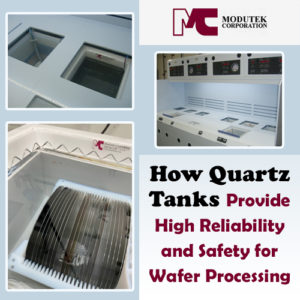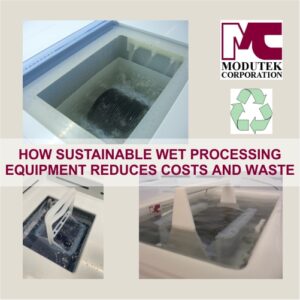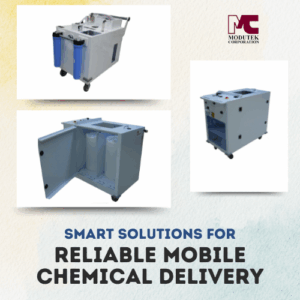 Because quartz is an inert substance that does not react with acids, quartz tanks are ideal containers for silicon wafer processing. The flame-polished quartz used in Modutek’s quartz tanks is impervious to the powerful acids used for processes such as SC1, SPM, and the Piranha process. Quartz tanks are designed to minimize particle contamination and to accurately control the temperature when required. As a result, quartz tanks deliver superior results for wet bench semiconductor fabrication.
Because quartz is an inert substance that does not react with acids, quartz tanks are ideal containers for silicon wafer processing. The flame-polished quartz used in Modutek’s quartz tanks is impervious to the powerful acids used for processes such as SC1, SPM, and the Piranha process. Quartz tanks are designed to minimize particle contamination and to accurately control the temperature when required. As a result, quartz tanks deliver superior results for wet bench semiconductor fabrication.
Quartz Tanks Reliably Reduce Particle Counts
As semiconductor products require tighter component packing, a reduced particle count becomes increasingly important. The size of the microscopic structures etched into silicon wafers is reduced to such an extent that a single particle can distort the required shape. The resulting semiconductor chips can be defective or have reduced quality. Sometimes, the performance could be improved, or the lifespan may be reduced. A low particle count is critical for achieving excellent quality output and a high yield from the semiconductor fabrication line.
Modutek’s quartz tanks reduce particle contamination to improve process results. The high-purity, flame-polished quartz used in Modutek’s quartz tanks is chemically inert to most chemical compounds, including acids, water, and salt. Since the quartz crystal does not react with the chemicals used in semiconductor fabrication, contamination from the quartz tanks is eliminated.
The quartz tank design also reduces particle contamination. Modutek’s quartz tanks are based on over 30 years of tank design experience to minimize particle contamination. The seamless design and sloped housing construction eliminate places where particles could become lodged. Actual results from real-world fabrication confirm that Modutek’s quartz tanks deliver low particle counts.
Accurate Quartz Tank Temperature Controls Produce Precise Results
For many wet bench processes, the etch rate depends on how the process is set up. The temperature, concentration, silicon wafer crystal lattice orientation, and possible doping of the silicon wafers all influence the etch rate. Except for the process temperature, all other parameters are determined at the start of the process. The temperature, on the other hand, varies. It rises quickly at the beginning and can change as the etching progresses. Precise temperature control is required for reliable etching results.
The etch rate is critical for determining the shapes and details of the microscopic structures etched into the silicon wafer. If etching does not proceed at the right speed, the etched shapes may be too large or too small. The resulting semiconductor products won’t have the expected characteristics and may have to be discarded.
Modutek’s quartz tanks feature a rapid temperature rise to the temperature set point and precise control. The temperature can be set at up to 180 degrees Centigrade. The temperature rises by up to 2 degrees C per minute and is controlled with a precision of plus or minus 1 degree C. The rapid temperature rise enables high throughput, while the tight temperature control ensures excellent repeatability.
Quartz Tank Design Influences Output Quality
The quality of silicon wet etching results depends on maintaining low particle counts and accurately controlling the process temperature. Modutek’s quartz tanks are designed with these two factors in mind. The tanks support wet bench processes such as SC1 and SPM and deliver consistent etching results. Reduced particle counts and excellent etch rate control are consistent during continuous manufacturing and across different batches.
Modutek Provides Safe and Reliable Equipment
Modutek works closely with customers to enhance their wet processing manufacturing results, resolve issues, and find effective solutions. Quartz tanks and other equipment provided by Modutek deliver high reliability and safe operation to support various wet processes. Contact us for a complimentary quote and consultation to discuss your unique needs.




